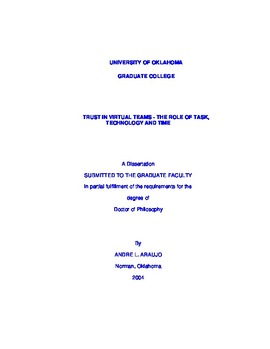| dc.contributor.advisor | Chidambaram, Laku, | en_US |
| dc.contributor.author | Araujo, Andre L. | en_US |
| dc.date.accessioned | 2013-08-16T12:19:30Z | |
| dc.date.available | 2013-08-16T12:19:30Z | |
| dc.date.issued | 2004 | en_US |
| dc.identifier.uri | https://hdl.handle.net/11244/777 | |
| dc.description.abstract | Virtual teams face major impediments to developing trust given their relative inability to evaluate other members' abilities, motivations and work patterns. However, trust is the foundation on which virtual teams can build effective performance strategies and accomplish group tasks. Empirical evidence suggests that trust can be developed among members of virtual teams, although it takes time to do so. Other key factors, in developing trust besides time include the task the group is engaged in and the work setting. Furthermore, social constructionist approaches assert that characteristics of organizational elements such as the task can change over time based on group perceptions that evolve as members interact and make sense of their embedded situations. Therefore, since different types of tasks and settings affect group processes and outcomes differently, the development of trust will vary according to the group's perceptions of the task over time and characteristics of the setting. This study developed an integrative model of trust in virtual teams by explicitly examining the interactions of task, technology and time, along with their combined impact on team processes and outcomes. This model was tested empirically using data from a longitudinal field experiment that manipulated setting type---virtual vs. collocated teams. Data about members' perceptions and team performance were collected using a repeated measures research design structured around a database design project. Results of the analysis provide partial support for the model and offer insights about the development of trust in virtual teams. Implications of the findings for research and practice are discussed. | en_US |
| dc.format.extent | xx, 364 leaves : | en_US |
| dc.subject | Psychology, Industrial. | en_US |
| dc.subject | Trust. | en_US |
| dc.subject | Business Administration, Management. | en_US |
| dc.subject | Virtual work teams. | en_US |
| dc.title | Trust in virtual teams: The role of task, technology and time. | en_US |
| dc.type | Thesis | en_US |
| dc.thesis.degree | Ph.D. | en_US |
| dc.thesis.degreeDiscipline | Michael F. Price College of Business | en_US |
| dc.note | Source: Dissertation Abstracts International, Volume: 65-08, Section: A, page: 3052. | en_US |
| dc.note | Adviser: Laku Chidambaram. | en_US |
| ou.identifier | (UMI)AAI3143537 | en_US |
| ou.group | Michael F. Price College of Business | |
